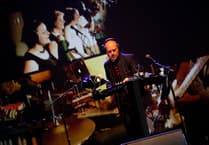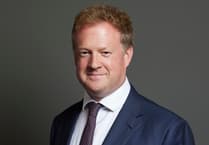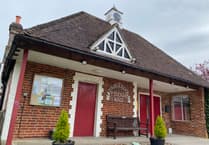There was a stunned silence at Whitehill & Bordon’s Armistice Day service after a vicar questioned the legitimacy of the Falklands conflict and called on those present to admit their inner selfishness.
In a ten-minute address, Revd Iain Robertson described the Falklands as islands that were “claimed to be” British territory and said the British task force was sent to the south Atlantic in 1982 to deal with “as we saw then, the Argentine oppressors”.
The first recorded landing on the Falkland Islands was made by an English captain in 1690. A French navigator founded the first settlement on East Falkland in 1764 and the British settled West Falkland in 1765.
Newly independent Argentina claimed sovereignty over what it called the Islas Malvinas in 1820. An Argentine settlement on the islands was destroyed by the USA in a seal hunting dispute in 1831. The British expelled the remaining Argentine officials in 1833 and installed a governor.
Argentina then began to protest at what it saw as occupation of the islands by the United Kingdom, and the dispute was still going on in 1965 when a United Nations resolution invited the two countries to find a peaceful solution.
On April 2, 1982, Argentina – under a military junta led by President Leopoldo Galtieri, who took over the role in December 1981 – invaded the Falklands and started a 74-day conflict which ended with a British victory on June 14, 1982.
The previous day holders Argentina had lost 1-0 to Belgium in the opening match of the 1982 World Cup. The game was not screened in the UK because hostilities with Argentina had yet to end. Diplomatic relations were finally restored in 1990.
Argentina says it has a right to the islands because it inherited them from the Spanish crown in the early 1800s. It also bases its claim on the islands’ proximity to the South American mainland.
But in 2013 the islanders voted to remain living in a British overseas territory. Britain rests its case on its long-term administration of the Falklands and on the principle of self-determination for the islanders, who are almost all of British descent.
Revd Robertson said: “The Falkland Islands, allowing for Iraq and Afghanistan, is the war that I remember as a child.
“And I remember seeing the fleets on television leave Portsmouth and Plymouth with the vessels being waved off with the military proudly going down to defend what we claimed to be British territory in the south Atlantic.
“I remember hearing a story of a naval chaplain who was on one of the ships of the fleet that took all those days to get down to the islands to set the islands free from, as we saw then, the Argentine oppressors.”
Revd Robertson also spoke of the current war between Russia and Ukraine: “Sadly, human nature being what it is, and whether we’re old or young, the natural calling within each and every one of us when trouble hits is to seek the selfish rather than to seek good for all.
“When we hear of war or when we learn of what war has been, we continue to remember and sometimes we use this language. We say that one side of a battle or a war is good and that the other side is evil.
“Perhaps even at the moment within the continuing war in Europe, would we see the people of the Ukraine fighting for their freedom? We may see them as the epitome of what is good and we may see the Russian Federation army and military as evil.
“But whatever side you fight on in a battle and in the war, there is good and there is evil, or there is light and there is darkness. There could be black and there could be white in regard to how people’s hearts are.
“The truth of the matter is that evil affects our world in two ways. The first evil is the selfishness which is in each and every one of us. If you’re here today and you’re saying to yourself I’m not selfish then you need to dig a bit deeper into yourself because you are.
“The selfishness of seeking yourself above all brings evil into this world and it allows evil to flourish. The other evil is the demonic, Satan and all his demons, and you could argue that perhaps Satan and all his demons quite often drive war, or lift up and empower the selfishness in human beings.”
Beyond Revd Robertson’s address, the service was as expected for the hundreds remembering the Fallen at the War Memorial at the junction of Camp Road and Ennerdale Road on November 11.
It was conducted by Revd Wendy Mallas. In her welcome and call to worship and remembrance, she said: “At the 11th hour of the 11th day of the 11th month the guns fell silent on the Western Front to bring an end to the First World War.
“Our nation and Commonwealth has recalled that moment through our Armistice and Remembrance events down the decades, decades during which men and women of our armed services have continued to pay the ultimate sacrifice.
“And so over 100 years later, we stand here today to remember the lives of the sacrificed in the service of our country, and those traumatised and injured in conflict.
“May we have such a devotion to justice and freedom that the heroism of all who fought, and still fight, may continue to be remembered in a nation of service and in a world of peace.
“On this Remembrance Day, in union with nations and people throughout the world, let us remember before God and commend to his sure keeping those who have died for their country in conflict, those whom we knew and whose memory we lovingly cherish, and all those who have lived and died in the service of humanity.
“We remember with gratitude their sacrifice, especially the 69 servicemen from our parish listed on our Roll of Honour.”
The congregation sang the hymn O God Our Help In Ages Past before wreaths were laid by Whitehill town mayor Cllr Leeroy Scott, Hampshire county councillor Andy Tree, East Hampshire District Council chairman Cllr Sally Pond, the Royal Navy, the British Army – represented by Lt Col Mark Ludlow – the Royal Air Force, the Royal Electrical and Mechanical Engineers, the Royal British Legion, Lions International, Hampshire Constabulary, Hampshire Fire and Rescue Service, relatives of the Fallen and the general public.
Mike Pendlington and East Hampshire district councillor Adam Carew read out the 69 names on the Roll of Honour as 69 children each laid a wooden cross on the War Memorial to remember each one.
They stopped halfway through the list at 11am for the exhortation by Lt Col Ludlow: “They shall not grow old, as we that are left grow old. Age shall not weary them, nor the years condemn. At the going down of the sun and in the morning, we will remember them.”
This was followed by the Last Post, the two minutes’ silence, Reveille and the Kohima Epitaph, read by Mr Pendlington: “When you go home, tell them of us and say, for your tomorrow we gave our today.”
After the reading of the Roll of Honour was completed, Cllr Scott then read a Bible passage from Philippians 4: 4-9 before Whitehill town councillor Bisi Kennard, holding her baby, led the congregation in singing the hymn Jerusalem.
Next came Revd Robertson’s address, then five Bordon children stepped up to the microphone to give readings before the crowd sang the hymn The TwoFatherlands.
Revd Mallas led prayers, ending with The Lord’s Prayer,then Oakmoor School head boy Thomas Copland read the poem In Flanders Fields. Following him was Oakmoor School head girl Caitlin Sobey who read the poem We Shall Keep The Faith.
The final hymn was He Who Would Valiant Be, then Revd Mallas read the Act of Commitment and The Blessing. The 65-minute service was brought to a close – using the male version of the words for the first time since 1951 – with The National Anthem.





Comments
This article has no comments yet. Be the first to leave a comment.